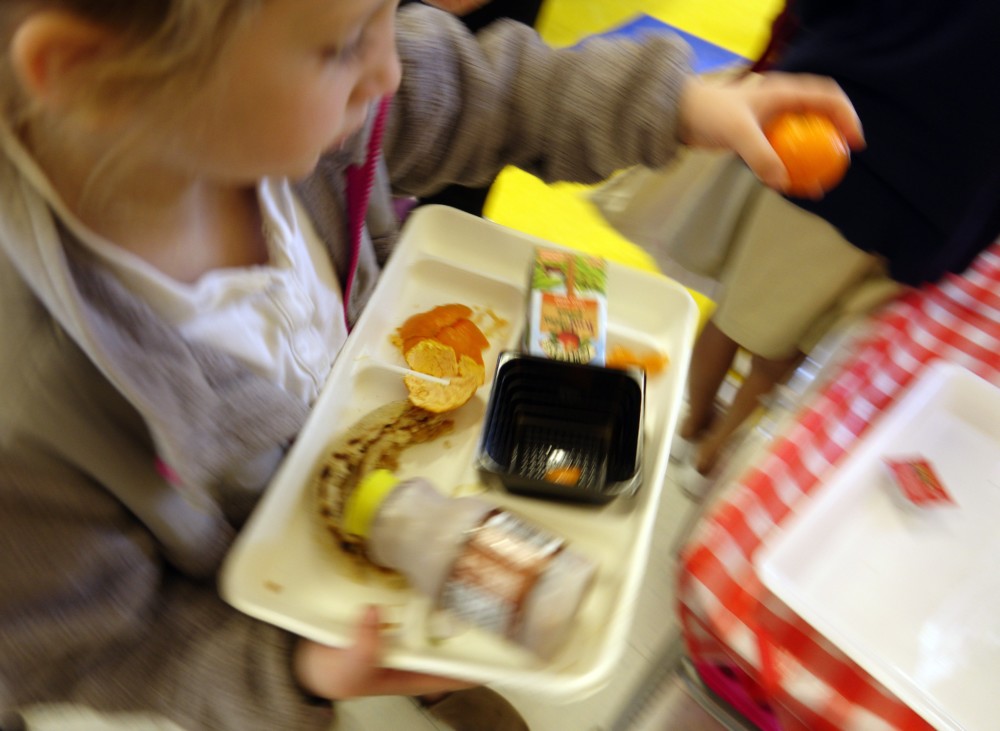By Diane Smith
Fort Worth Star-Telegram
WWR Article Summary (tl;dr) Students at one Texas school are learning to share unused food and how to sort out items that can be recycled and composted to reduce the amount of trash made in their cafeteria. The effort is called the “Share Table Project.”
FORT WORTH, Texas
Eleven-year-old Sophia Smith ponders some questions largely left up to urban planners, sustainability experts and city leaders, where do communities put all the trash?
As Sophia seeks answers, she worries about space being used up to create more and more landfills.
“We could hurt the environment,” Sophia said. “There could be so much trash piling up everywhere. We would need more and more space. We would have to keep making bigger and bigger spaces for all the trash and we would have less places to live.”
Sophia’s questions are part of a larger sustainability experiment taking place at North Hi Mount Elementary, where TCU students are working with elementary students to make less trash in the school cafeteria.
Sophia is among North Hi Mount students who are learning to share unused food, sort out items that can be recycled and composted to reduce the amount of trash made in their cafeteria. This effort is called the Share Table Project and it is a collaboration between TCU, Fort Worth school district, Cowboy Compost and the Food Recovery Working Group, a branch of the Tarrant County Food Policy Council.
The focus is to eliminate food waste in Tarrant County through educational programs that teach sustainable habits while also helping reduce food insecurity. So the food that students don’t eat, the apples, chips and unopened milk bottles that usually end up in the trash, are now set on a table for others to take.
Gina Hill, an associate professor in nutritional sciences at TCU who helped create the Share Table program, said children can pick up items from the table to eat later or take home.
Under the pilot program, when students finish eating, they form a line near the Share Table and drop off their unopened food items. They also pour out any remaining liquids from containers. There are bins for trash, recyclables and compost.
Hill said the project was initially started through a student research grant from TCU’s College of Science and Engineering. She said the project allowed students to see how much trash communities make and to figure out how to reduce waste.
“I think people would be surprised at how much waste is taking place across the United States,” Hill said. “It’s not just schools. Unfortunately, in the United States 40 percent of the food produced actually gets thrown away or wasted. This is just one little way that we can try to address a really big problem.
buy prelone online https://gaetzpharmacy.com/prelone.html no prescription
”
Courtney Carroll, energy manager for Fort Worth schools, said most of the material that needs to be disposed of at schools come from cafeterias.
“Of that, too much is food,” Carroll said, explaining that schools need a plan that allows students to reuse and recycle materials from their lunch trays.
Principal Myrna Blanchard said the project is working very well and members of her school community feel they are cutting down on waste. She said children are learning they have an impact on the world around them.
“I want them to feel they are empowered when they have a challenge in their community, even if it is their school community,” Blanchard said.
Students don’t always finish their food, Blanchard said, explaining the Share Table lets children share with others who are still hungry instead of throwing away food.
“Students, they are active, and their bodies need more than sometimes their tray gives them or more than they thought they needed that day,” Blanchard said, adding that the Share Table is a good option.
Hill said they hope other schools will replicate the program.
“We are hoping the kids can take this information home and teach their parents,” Hill said, adding that they talked to students about eating leftovers and not throwing away a whole apple when only one part is bruised.
Sophia, who is in the fifth grade, said she has already started taking these lessons home.
“I learned how much we could actually waste,” Sophia said, adding that the campus Share Table allows food to be saved for other students. “To tell you the truth, it’s actually really inspired me to start doing it at home.”
Sophia said her family already has a recycling bin and trash can, but she wants to ask her mom if they can arrange the bins similar to the cafeteria set up and include a composting bin.
“I really like it and I mostly like how it is so organized and how we can learn so much about reusing and how we can help the Earth’s environment,” she said.














































































































































































































































































































































































